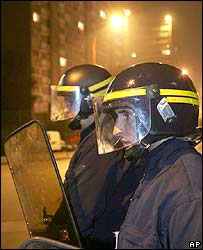|
By Henri Astier
BBC News, Paris
|


Immigrant suburbs sometimes look like war zones
|
Police responsible for law enforcement in France's tense immigrant-majority housing estates liken their job to a military mission.
"What we have is urban warfare," according to Patrick Trotignon, a 30-year veteran working for the police union Synergie.
Gaelle James, an officer who works in Montreuil, a poor suburb just east of Paris, agrees.
"We are confronted by ever more criminals who are getting ever more violent," she says.
"They are now out to kill cops."
This may sound like hyperbole - but a year after a wave of rioting spread through France's ghettos, a number of attacks in recent weeks seem to confirm this grim assessment.
On 13 October, for instance, police responding to an emergency call in Epinay-sur-Seine, north of Paris, drove into a trap - two cars blocked their vehicle, which was set upon by dozens of youths wielding iron bars and knives.
The officers fought their way out without firing their guns, but one ended up in hospital with a broken jaw.
Ms James says this kind of attack is becoming worryingly frequent - washing machines have even been dropped from tower blocks on official vehicles.
"Doctors and other emergency services no longer venture into some estates," she notes.
The increasingly organised nature of violence is highlighted in a recent report by the interior ministry's intelligence service.
A future wave of suburban disturbances, it warns darkly, could target "the last remaining institutional representatives in a number of areas - the police".
Filming attacks
According to Mr Trotignon, the attacks are the work of teams structured along military lines.
"Operations are planned by senior commanders, with underlings making emergency calls and the foot soldiers carrying out the assaults," he says.
"And the icing on the cake is filming the whole thing with your mobile phone."
The violence in French suburbs has devastating consequences on police morale. "Those posted there can't leave fast enough," Mr Trotignon says.
The impoverished area of Seine-Saint-Denis north-east of Paris - where the 2005 riots began - is "haemorrhaging" officers, he adds, as those with enough seniority get transferred to the provinces.
This high turnover means that those tasked with France's most dangerous districts tend to be young - as the prefect, the top official in Seine-Saint-Denis, noted in a leaked note to the interior ministry.
The prefect and many in the police blame this situation on soft judges reluctant to jail the young offenders.
After last year's disturbances, the prefect wrote, only one minor in Seine-Saint-Denis was imprisoned out of 85 prosecuted.
"What's the point of taking risks to catch criminals when they can just walk out of court?" Ms James complains.
'Wildlife park'
According to Mr Trotignon, the head of the Seine-Saint-Denis tribunal is nicknamed "Father Christmas" by delinquents.
But few in the suburbs feel they are getting fair - let alone preferential - treatment from the authorities.
Contempt for police, in particular, is almost universal among young men. Here is a sample of quotes from youths recently interviewed in housing estates near Paris:
- "We don't want a police station here. Some cops are racist."
- "Riots are caused by police. They think we are all delinquents."
- "The cops don't respect us. They come in and smash doors. They systematically suspect blacks and Arabs."
- "Some cops are aggressive and use racial slurs when they check you."
Older residents, of course, express different views. They deeply resent the rampant lawlessness and want more, not fewer, police.
 |
Youths from the French suburbs say they think all the ingredients for chaos remain

|
"Cars are vandalised and youths fight all the time, but when we call the cops they never come," complains a North African man living in Clichy-sous-Bois, a dismal ghetto north-east of Paris.
Nadir Dendoune, a 34-year-old journalist living in l'Ile-Saint-Denis, says what is needed above all is better policing.
"When I was young, the cops were patrolling on mopeds and talked to us," he recalls.
"Now they don't know us. They just patrol the area locked in their cars and look around as if they were in a wildlife park."
Beatings
In 2002 Interior Minister Nicolas Sarkozy decided to abandon community policing based on prevention in favour of a strict law-and-order approach.
Beat officers were replaced by shock "anti-crime brigades" who police the suburbs mostly from outside. Many local officials and youth workers in the suburbs feel this was a dreadful mistake.
 |
2005 UNREST IN FIGURES
9193 cars burnt
2,921 arrests
21 nights of riots
Source: French police
|
"In this area community-based policing played a very positive role. Officers did real work in the estates," says Clichy's deputy mayor, Olivier Klein.
"Now they go in only for tough security missions, but this does not make people more secure."
Laurence Ribeaucourt, a social worker in the Clichy area, says the riots reveal a growing divide between police and people.
"For the past three years things have been getting steadily worse," she says. "Youths tell me they have been beaten up in custody and harassed by police."
Whether France's housing estates need soft "prevention" or tough repression is a matter of debate.
What is beyond dispute, however, is that the law is no longer enforced in many of France's deprived suburbs.
Relations between large sections of the population and the police have broken down.


~RS~q~RS~~RS~z~RS~47~RS~)